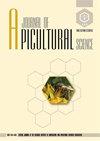保加利亚不同地区蜂胶理化、抗氧化和抗菌性能的比较研究
IF 0.8
4区 农林科学
Q4 ENTOMOLOGY
引用次数: 1
摘要
摘要蜂胶是由欧洲蜜蜂(Apis mellifera L.)生产的一种有价值的生物混合物,在传统医学和替代医学中被广泛应用,是一种有效的食品生物防腐剂和营养价值增强剂。本研究旨在调查2020-2022年期间从保加利亚所有28个地区采集的80个蜂胶样本,以确定其理化性质以及抗氧化和抗菌潜力。生蜂胶样品呈现棕色或绿色,这取决于采集它们的气候区和pH值为4.82至5.87,而水分含量在0.98%至2.97%之间。总酚含量(TPC)和总黄酮含量(TFC)分别为63.14 mg GAE/g至737.27 mg GAE/g和29.22 mg QE/g至234.17 mg QE/g。通过DPPH和FRAP方法测定的蜂胶样品显示出显著的抗氧化潜力,分别为18.56mM TE/g至1598.66mM TE/g.和82.28mM TE/g-1208.81mM TE/g,其值与TPC和TFC呈正相关(r2)。抗菌筛选结果显示,浓度为20mg/ml的甲醇蜂胶提取物对革兰氏阳性菌如黄微球菌2YC-YT、枯草芽孢杆菌ATCC 6633、金黄色葡萄球菌ATCC 25923、单核细胞增生性李斯特菌NBIMCC 8632和无害李斯特菌ATCC 33090表现出最高的抑制作用。本文章由计算机程序翻译,如有差异,请以英文原文为准。
Comparative Study on Physicochemical, Antioxidant and Antimicrobial Properties of Propolis Collected from Different Regions of Bulgaria
Abstract Propolis (bee glue), a valuable biological mixture produced by European honey bees (Apis mellifera L.), is widely used as a remedy in traditional and alternative medicine, as an effective food biopreservative and as a nutritional value enhancer. The present study aimed to investigate eighty propolis samples collected from all twenty-eight districts of Bulgaria in the period of 2020–2022 in order to determine their physicochemical properties as well as their antioxidant and antimicrobial potential. The raw propolis samples exhibited brown or green colour depending on the climatic zone from which they are collected and pH values from 4.82 to 5.87, while the moisture content ranged between 0.98% and 2.97%. The total phenolics content (TPC) and total flavonoids content (TFC) varied from 63.14 mg GAE/g to 737.27 mg GAE/g, and from 29.22 mg QE/g to 234.17 mg QE/g, respectively. The propolis samples demonstrated significant antioxidant potential determined by DPPH and FRAP methods, from 18.56 mM TE/g to 1598.66 mM TE/g and from 82.28 mM TE/g to 1208.81 mM TE/g, respectively, whose values showed a positive correlation (r2) with the TPC and TFC. The results from the antimicrobial screening revealed that the methanolic propolis extracts in concentration of 20 mg/ml exhibited the highest inhibitory effect on the Gram-positive bacteria such as Micrococcus luteus 2YC-YT, Bacillus subtilis ATCC 6633, Staphylococcus aureus ATCC 25923, Listeria monocytogenes NBIMCC 8632 and Listeria innocua ATCC 33090.
求助全文
通过发布文献求助,成功后即可免费获取论文全文。
去求助
来源期刊

Journal of Apicultural Science
ENTOMOLOGY-
CiteScore
1.70
自引率
0.00%
发文量
9
审稿时长
>12 weeks
期刊介绍:
The Journal of Apicultural Science is a scientific, English-language journal that publishes both original research articles and review papers covering all aspects of the life of bees (superfamily Apoidea) and broadly defined apiculture. The main subject areas include:
-bee biology-
bee genetics-
bee breeding-
pathology and toxicology-
pollination and bee botany-
bee products-
management, technologies, and economy-
solitary bees and bumblebees
 求助内容:
求助内容: 应助结果提醒方式:
应助结果提醒方式:


